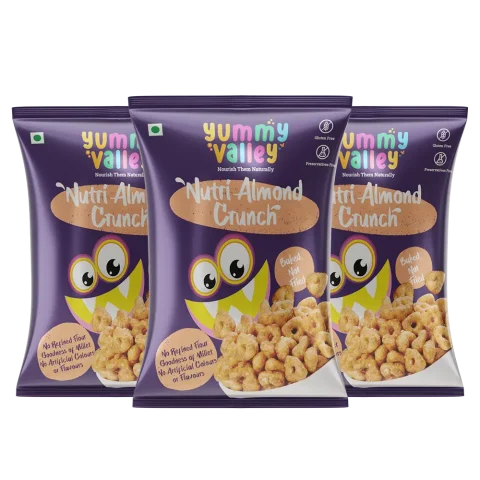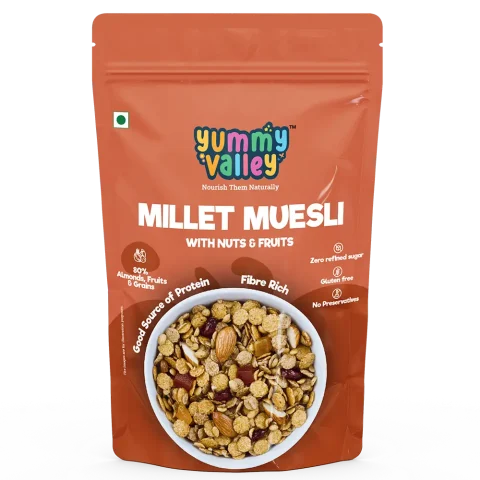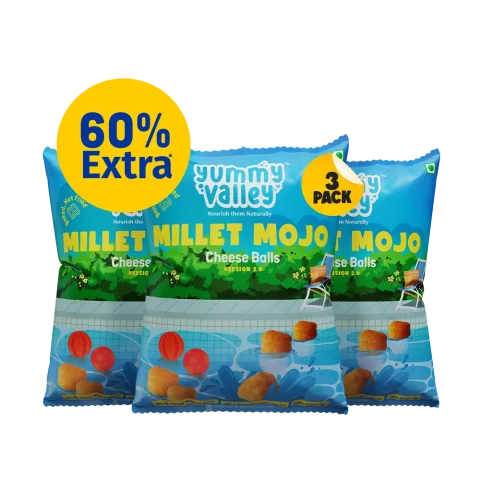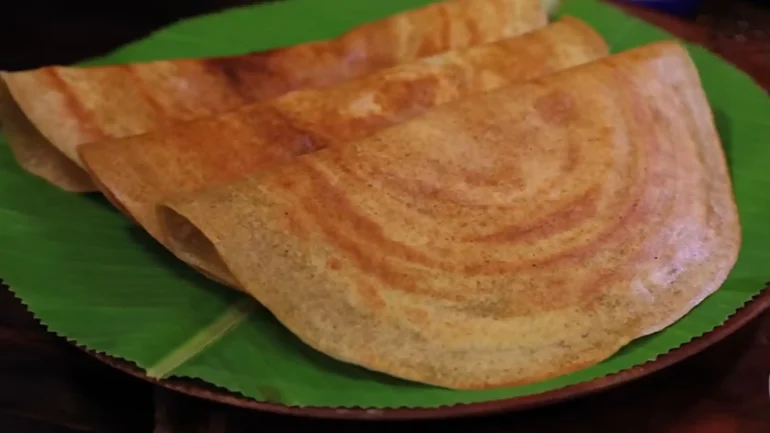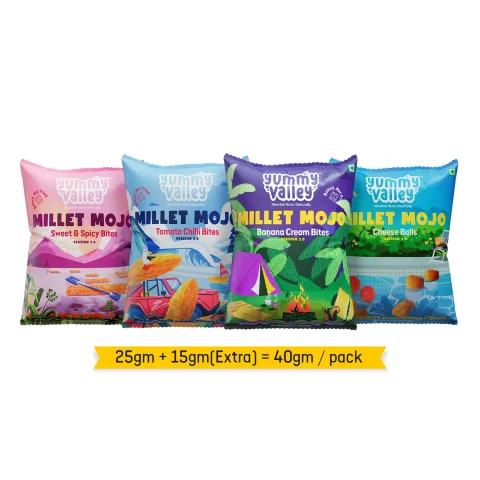Browntop Millet: Benefits, Nutrition, Uses, Recipes, Side Effects & More
- Published on:
- Last update: 27 March 2025
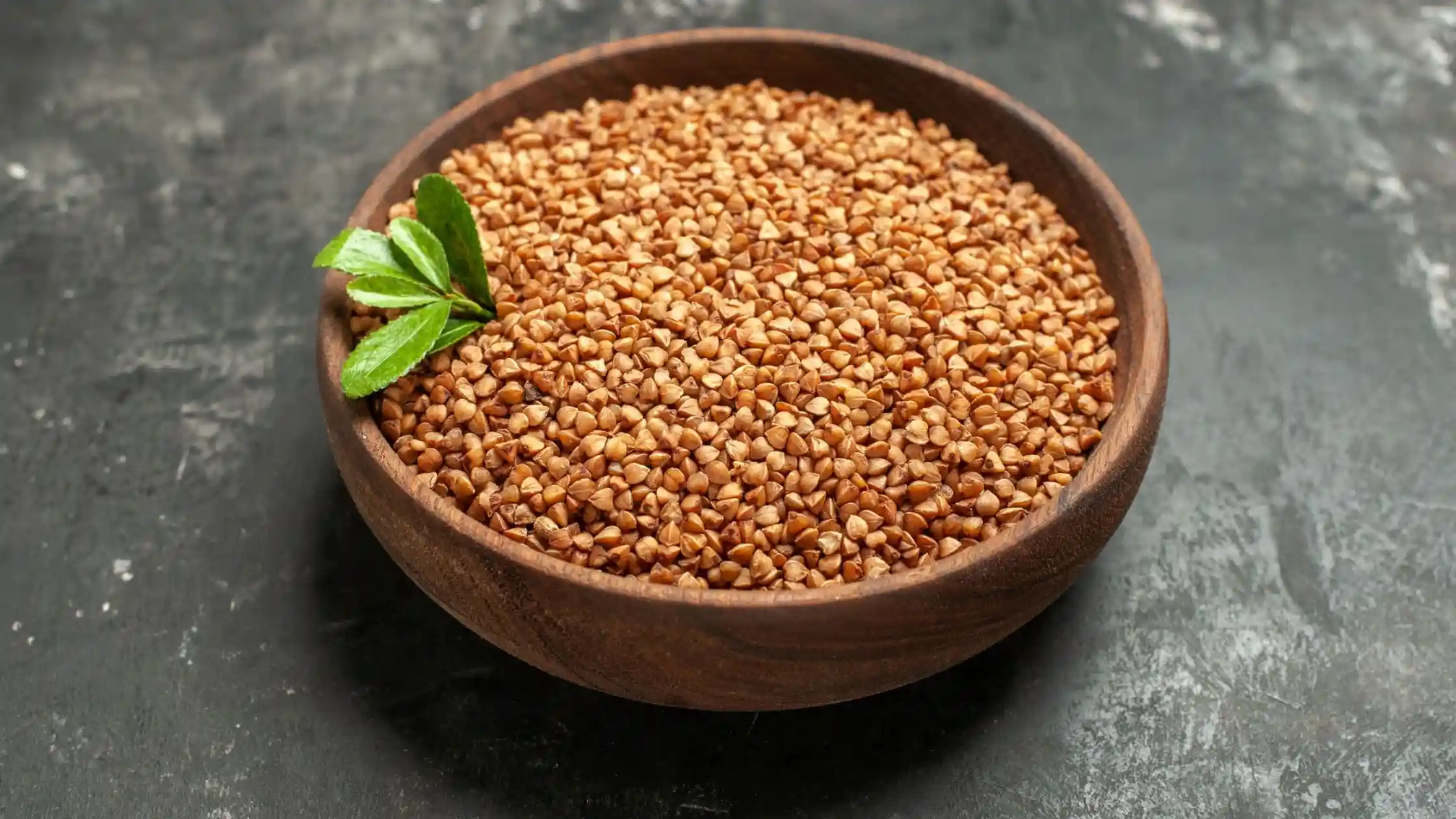
Looking to amp up your health game without sacrificing taste or convenience? Consider giving Browntop Millet a shot. This little grain, cultivated for ages across India, Africa, and Asia, packs a punch when it comes to nutrition. Packed with protein, fibre, B vitamins, and an array of minerals, it’s a powerhouse that supports your body’s well-being, offering antioxidant benefits to combat stress and inflammation.
Not just a health boost, Browntop Millet can aid in managing various lifestyle ailments like diabetes, high cholesterol, anaemia, and digestive issues while strengthening your immunity and keeping you fueled up. Plus, it’s a breeze to cook and incredibly versatile—use it whole, as flour, or explore its delicious potential in diverse recipes, from traditional to modern twists.
In this article, we will explore the Browntop Millet benefits, uses, nutrition, recipes, and more, the superfood that can transform your health and lifestyle. Join us as we discover the wonders of this ancient grain.
What is Brown Top Millet?
Ever wondered about Browntop Millet? This grain, scientifically known as Brachiaria ramosa, has been a dietary staple and livestock fodder for centuries worldwide. What sets it apart is its knack for thriving in tough conditions, demanding little water and resources while delivering top-notch nutrition. In India, it’s a star in rain-fed areas like Andhra Pradesh and Karnataka, serving up as a whole grain or flour, often complementing other crops and even boosting farm biodiversity.
Additionally, Browntop Millet can prevent soil erosion and conserve water in hilly areas, where conventional crops often fail to thrive. This was proven by a successful trial conducted in Koraput, Odisha, where this Millet was introduced as a new crop and showed promising results in terms of yield and quality.
As you can see, Browntop Millet is a versatile and valuable grain that can offer multiple benefits for our health and environment. Let’s learn more about its nutritional profile and how we can use it in our daily meals.
Browntop Millet Nutritional Value per 100 Grams
Curious about Browntop Millet’s nutrition? It’s packed with goodies—think protein, fibre, B vitamins, magnesium, phosphorus, iron, and more essentials for our body. While specifics might vary based on grain type, quality, and growth conditions, here’s a rough overview of what you’ll find per 100 grams.
| Nutrients | Value per 100 Grams |
|---|---|
| Carbohydrates | 71 g |
| Protein | 8 g |
| Fibre | 9 g |
| Fat | 65 g |
| Potassium | 188 mg |
| Sodium | 10 g |
Benefits of Browntop Millet
One of the main reasons why you should include Browntop Millet in your diet is its incredible health benefits. Browntop millet supports heart health by reducing LDL cholesterol, preventing arterial clots, and enhancing cardiac function. With its rich protein, fibre, and low carbohydrate content, it’s a key player in lowering cardiovascular disease risk.
Here are some of the Browntop Millet benefits for your health:
1. Nutritional Powerhouse
There are plenty of nutrients in it, including protein, fibre, and B vitamins (niacin, thiamin, riboflavin). Plus, it brings in magnesium, phosphorus, and iron—essential for energy, brain function, immunity, and red blood cell formation. Eating this keeps your nutrition in check, ensuring a fit and healthy you.
2. Manage blood sugar effectively
For those tackling diabetes, this grain steps up. Swap rice for Browntop Millet—it keeps you full longer, curbing appetite and calorie intake. With a low glycemic index and carb content, it avoids spiking your glucose levels, helping manage blood sugar effectively.
3. Good for Digestion
Say goodbye to digestive woes! The fibre in Browntop Millet keeps things moving smoothly, preventing constipation and nurturing a happy gut. Plus, it feeds those good gut buddies, boosting digestion and immunity. In short, it’s a win for your digestive health.
4. Enhances Cardiac Health
Guard your heart with Browntop Millet. It’s a superstar in keeping cardiovascular issues at bay. By cutting down LDL cholesterol—the troublemaker that clogs arteries—this grain supports a healthy heart and vessels. Packed with protein, fibre, and low carbs, it’s your ally in managing blood pressure, sugar, and inflammation, ultimately boosting cardiac function.
5. Strengthens Bones
By incorporating Browntop Millet into your regular meal plan, you can fulfil your body’s calcium and phosphorus needs, which are important for your bone health. You can also benefit from magnesium, which prevents cramps and spasms by relaxing your muscles. Don’t underestimate the benefits of Brown Top Millet in keeping your bones and muscles healthy and strong.
6. Helps with Weight Loss
It’s all about keeping fat in check. With a low glycemic index and carbs, this grain stops blood sugar spikes that lead to fat storage, keeping your metabolism revved up.
Want to shed those pounds? Browntop Millet’s got your back. Its fibre content nourishes the good bacteria in your gut, fostering better digestion and immunity. A happy gut equals a better shot at weight loss!
By substituting rice with Browntop Millet daily, you can reap these benefits and achieve your weight loss goals. Experience the benefits of Browntop Millet and step towards a healthier lifestyle.
Browntop Millet Uses
Beyond being healthy, this grain has a taste sensation that fits into any dish—classic or contemporary.
Prep Pointers: Soak it beforehand to rid any bitterness and boost digestibility. For an extra nutty touch, lightly toast it in a dry skillet. Cooking times and liquid ratios vary, so stick to recipes or package instructions for optimal results.
Browntop Millet is a culinary all-rounder. Explore its cultural significance, traditional uses, its role in diverse dishes, and baking applications, and even its place in fermentation and brewing—it’s a versatile ingredient with endless possibilities!
Here are some ideas you can adapt to fit your needs and preferences:
- Porridges and Pilafs: Cook it up in water or broth for a cosy porridge or pilaf. Amp up the taste and nutrition by tossing in herbs, spices, and veggies. Fancy a South Indian touch? Go for a porridge with coconut milk, jaggery, and cardamom. Or dive into a Middle Eastern pilaf jazzed up with onion, garlic, raisins, and almonds.
- Gluten-Free Goodness: Whip up flatbreads that are both delicious and gluten-free. Create a dough by mixing flour with water, salt, and yoghurt or oil if desired. Roll it out and fry it on a griddle or skillet. Fancy trying a Karnataka-style ragi rotti with onion, green chillies, and curry leaves? Or maybe an Ethiopian-style injera, made with teff and sourdough starter, tempts your taste buds!
- Savoury Fillings: Use cooked millet mixed with herbs, spices, onion, garlic, and chopped veggies to stuff bell peppers, zucchini, or tomatoes. Bake or grill them for a satisfying treat. Fancy a Mediterranean twist? Try stuffed peppers loaded with feta cheese, olives, and oregano. Or opt for a Mexican vibe with stuffed zucchini featuring black beans, corn, and salsa—it’s a flavour adventure!
- Refreshing Salads: Toss cooked millet with fruits, nuts, seeds, and dressings for salads that are both refreshing and satisfying. The mix of chewy, nutty, and sweet flavours elevates these dishes. Additionally, serve it as a side dish alongside curries, stews, or grilled meats—just like you would with rice or couscous. Fancy a Greek touch? Go for a salad featuring cucumber, tomato, parsley, and lemon juice. Or venture into Moroccan cuisine with a side dish boasting apricots, pistachios, and cinnamon—it’s a delightful fusion of flavours!
- Thicker & Heartier: Enhance your soups and stews by adding Brown Top Millet—it thickens them up and adds substance. Cook the millet directly in the soup or stew or prepare it separately before adding. You can even blend it with some liquid to create a creamy base. For a Chinese twist, try a soup with chicken, ginger, and scallions. Or opt for a French-style stew featuring beef, red wine, and mushrooms—it’s a flavorful upgrade!
- Wholesome Start: Cook the millet with milk or water and add sweetness for a delightful breakfast cereal. Amp up its appeal and nutrition by adding fruits, nuts, seeds, honey, or maple syrup. For a delicious twist, try a porridge featuring apple, cinnamon, and walnuts. Or whip up granola with oats, coconut, and cranberries—it’s a hearty and nutritious way to kickstart your day!
- Flavourful Twist: Swap in Brown Top Millet flour for a gluten-free baking adventure—it brings flavour, texture, and nutrition to bread, muffins, pancakes, and cookies. Don’t stop there—whole or cracked millet adds crunch and intrigue to your baked treats. Try bread with banana, chocolate, and flax seeds for a unique twist. Or whip up cookies with peanut butter, oatmeal, and raisins—it’s a delicious way to explore gluten-free baking.
Also Read: Foxtail Millet Benefits & Side Effects
Healthy Browntop Millet Recipes
1. Browntop Millet Dosa Recipe
Get ready for a crispy, nutritious adventure with Browntop Millet Dosa! This delightful dosa stars browntop millet, urad dal, and fenugreek seeds. It’s the gluten-free, vegan hero you’ve been waiting for, ready to rock your plate alongside chutney, sambar, or podi. Go on, dive into this tasty dosa delight!
Ingredients
- 1 cup browntop millet
- 1/4 cup urad dal
- 1/4 teaspoon fenugreek seeds
- Salt to taste
- Oil or ghee for frying
Instructions
- Let’s whip up some magic with the Browntop Millet, urad dal, and fenugreek seeds! Start by giving them a good wash and soak in water for 6 to 8 hours or just let them hang out overnight.
- Once they’ve had their soak party, drain the water and blend these soaked goodies into a smooth, thick batter. Add water as needed. Mix this batter into a large bowl, add in some salt, and give it a good mix.
- Now, let it chill and ferment for 8 to 10 hours or simply leave it overnight in a cosy spot.
- When it’s time to cook, get your dosa tawa or non-stick pan ready on medium-high heat—give it a light grease with some oil or ghee. Take a spoonful of batter and pour it onto the centre of the tawa. Then, grab the back of the spoon and spread the batter in circles to make a thin and even dosa.
- Drizzle a bit of oil or ghee around the edges and on top of the dosa. Let it cook for a few minutes until the bottom turns that lovely golden and crispy shade. Feeling extra crispy? Flip it and let it cook for another minute. Fold it up and slide it off the tawa. Ready for more? Repeat the delicious process with the rest of the batter!
- Serve the hot browntop millet dosa with your choice of chutney, sambar, or podi. Enjoy!
2. Browntop Millet Payasam Recipe
Ingredients
- 1/4 cup browntop millet
- 2 cups water
- 1/2 cup jaggery, grated or powdered
- 1/4 cup water
- 1 cup coconut milk
- 1/4 teaspoon cardamom powder
- 2 tablespoons ghee
- 2 tablespoons mixed nuts, chopped
Instructions
- Shake all the water out and give it a good wash.
- After that, cook it for about 10 minutes in a pressure cooker on low heat. It will start smelling yummy and getting toasty once you stir it now and then.
- Let the cooker bubble for a few minutes after adding 2 cups of water.
- Cook the millet until it becomes soft and happy by closing the lid and steaming three to four times.
- You can open the lid once it’s all set up by releasing the pressure.
- In a separate small pot, heat 1/4 cup of water and 1/4 cup of jaggery until the jaggery completely dissolves.
- Make this syrup smooth by straining it and setting it aside.
- Cooked millet should be mixed with coconut milk and cardamom powder.
- Make sure it’s well mixed and set it aside on low heat for at least 10 to 15 minutes to thicken.
- Fry those nuts in ghee until they’re golden and crispy.
- Place them on a plate for later—they’re ready to shine!
- Serve the brown top millet payasam hot or cold, garnished with the fried nuts. Enjoy!
3. Browntop Millet Upma
Browntop Millet Upma is a satisfying and savoury breakfast or snack crafted from browntop millet, onion, green chilli, ginger, and assorted veggies. It’s a gluten-free and vegan delight that pairs perfectly with chutney, pickle, or curd.
Ingredients
- 1 cup browntop millet
- 2 tablespoons oil
- 1 teaspoon mustard seeds
- 1 teaspoon urad dal
- 1 teaspoon chana dal
- A few curry leaves
- 1 onion, finely chopped
- 1 green chilli, slit
- 1-inch ginger, grated or finely chopped
- 1/4 teaspoon turmeric powder
- Salt to taste
- 2 cups water
- 1/4 cup carrot, finely chopped
- 1/4 cup green beans, finely chopped
- 2 tablespoons coriander leaves, chopped
Instructions
- Get the BrownTop Millet ready by washing and soaking it in water for 15 to 20 minutes—then just drain it and put it to the side.
- In a big pan on medium-high heat, pour in some oil and toss in those mustard seeds. When they start popping, add the urad dal, chana dal, and curry leaves. Cook them until they turn all golden and crunchy.
- Now, let’s cook up the onion, green chilli, and ginger until the onion goes soft and see-through. Sprinkle in some turmeric powder and salt.
- Time for the water! Pour it in, bring it to a boil, and then add the carrots, beans, and the soaked millet. Give it all a good mix.
- Let it cook for 15-20 minutes on medium heat.
- Serve the hot browntop millet upma with your choice of chutney, pickle, or curd. Enjoy!
you save ₹15
you save ₹44
Side Effects of Browntop Millet
The thyroid gland may be adversely affected by excessive consumption of millet. Individuals with intestinal disorders may experience exacerbated symptoms, particularly with Browntop Millet. While millets provide essential amino acids, an excess of these can lead to digestive issues.
Here are some of the detailed Browntop Millet side effects;
1. Delayed digestion
Browntop millet is high in fibre, which can slow down the digestion process and cause bloating, gas, and abdominal discomfort. People with intestinal disorders may have difficulty digesting browntop millet and should consume it in moderation.
2. Thyroid dysfunction
Browntop millet contains substances called goitrogens, which can interfere with the functioning of the thyroid gland and cause goitre, an enlargement of the thyroid gland that results in neck swelling. This effect is more likely to occur in people who have iodine deficiency or consume excess amounts of browntop millet.
3. Oxalate accumulation
Browntop millet contains oxalates, which are compounds that can bind to minerals like calcium and form crystals in the kidneys, leading to kidney stones. If you’ve had kidney stones or kidney issues, go easy on the millet and guzzle down loads of water to wash out those oxalates.
4. Nutrient absorption
Now, this millet has some phytic acid and tannins that can be party poopers, blocking minerals like iron, zinc, and calcium from being absorbed. But fear not! Soak, sprout, or ferment your millet before cooking—it helps tone down these anti-nutrients and makes those minerals more available.
5. Allergic reaction
Some folks, especially those sensitive to gluten or with celiac disease, might get the heebie-jeebies from Browntop Millet. Watch out for itchiness, swelling, rashes, or tummy troubles like nausea, or vomiting. If you feel off after munching on millet, best to get checked out ASAP!
Share this post:



